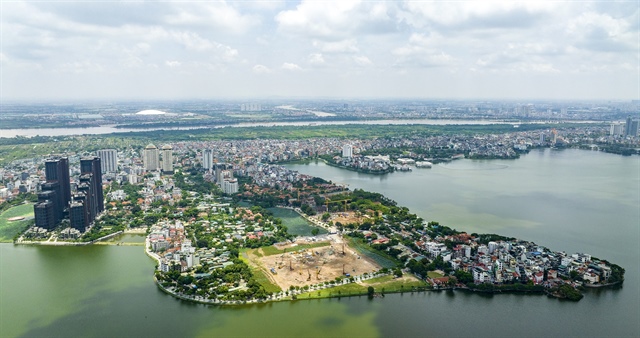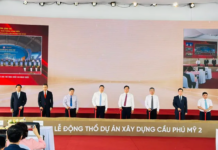In the draft Law amending and supplementing a number of articles of the Land Law, the Ministry of Agriculture and Environment proposes to amend Article 158 on the principles, bases, and methods of land price valuation.
Accordingly, land valuation must ensure four principles: guaranteeing the representative role of the state as the landowner and its decision-making power over land prices; ensuring that the results of land valuation methods serve as a reference for the state when deciding on land prices; adhering to the proper sequence and procedure for land valuation; and ensuring alignment with state management requirements and local realities.
Notably, the revised draft proposes a notable change by removing the principle of determining land prices based on market values.
Divergent Opinions
In an interview with our reporter, Dr. Pham Viet Thuan, Director of the Institute of Economics, Natural Resources, and Environment in Ho Chi Minh City, asserted that removing the phrase “determining land prices according to market principles” from the draft Law amending and supplementing several articles of the Land Law is appropriate.
According to Mr. Thuan, the technical term “market principles” implies stabilizing market prices and creating a foundation for healthy and transparent functioning. However, in practice, this phrase is often misinterpreted as “closely following market prices” or “approaching market prices.”
“It is necessary to clarify and contextualize the usage of terminology in constructing the land price framework. The basis for establishing the price framework must be explicitly stated,” emphasized Mr. Thuan.

According to experts, the absence of the ‘market-based’ principle in land valuation increases the risk of a disconnect between state-determined prices and actual transaction prices. Photo: Thao Nguyen |
Meanwhile, economist Nguyen Quang Huy, CEO of the Faculty of Finance and Banking at Nguyen Trai University, stated that the absence of the “market-based” principle in the revised draft is seen as an effort to strengthen the state’s role in guiding, regulating, and stabilizing the market in the context of complex land price fluctuations, which pose risks to macroeconomic stability and social equity.
However, Mr. Huy argued that the “market value” principle is not merely a technical consideration but also an objective measure to ensure a balance of interests between the state, citizens, and enterprises. Omitting this principle in valuation increases the risk of a disconnect between state-determined prices and actual transaction prices.
Therefore, the expert recommended retaining the principle of “conformity with market value under normal conditions” while closely associating it with the state’s control and guidance.
The state should retain the final decision-making power over land prices, but this decision must be based on transparent and scientifically determined market prices, with independent auditing.
Should the State Determine Land Prices in the Primary Market?
According to the draft, land valuation must ensure the state’s representative role as the landowner and its decision-making power over land prices.
Economist Nguyen Quang Huy analyzed that affirming the state’s role in determining primary land prices is entirely consistent with the nature of collective land ownership. In many cases, especially in areas with abnormal land price fluctuations or signs of speculation, the state needs a powerful tool to guide the market and avoid long-term social consequences.
Land is not just a source of revenue for the state but also an input for the entire economy, a living space, and a foundation for development. Therefore, a decision on land prices should reflect both macroeconomic regulation and practical realities while maintaining societal trust.
Hence, Mr. Huy recommended that the state should determine primary land prices based on objective data, transparent processes, and independent feedback from multiple stakeholders (including valuation organizations, industry associations, and auditing agencies).
“In cases of land allocation and leasing without auctions, a publicly supervised negotiation mechanism should be established. This approach ensures market principles while preventing the loss of national resources,” Mr. Huy stated.
According to the expert, land valuation, appraisal, and price determination should be designed as a cross-checking process, ensuring mutual oversight among the involved parties.
There should be a clear separation of functions: independent valuation consulting organizations; an interdisciplinary appraisal council with the participation of representatives from the public, businesses, and experts to provide feedback and appraisal; and a state agency with the final decision-making power.
Additionally, the roles of the State Audit Office, the Vietnam Fatherland Front, and professional organizations should be strengthened, especially in large projects, land use conversion cases, or land clearance and compensation.
These measures not only ensure transparency but also improve policy quality, enhance trust among the people and enterprises, and create a solid foundation for sustainable development.
Dr. Pham Viet Thuan shared that the nature of primary land prices was previously based on the land price framework, but the 2024 Land Law has removed this framework.
Therefore, it is appropriate for the state to determine primary land prices in a market economy oriented towards socialism, and it is an inevitable trend. Establishing transparent primary land prices will contribute to market stabilization and limit abnormal price fluctuations.
“With clear primary land prices, we can easily determine secondary land prices by applying adjustment coefficients. This approach will stabilize the market, prevent sudden price increases, and avoid mechanisms that may cause instability in the real estate market,” said Mr. Thuan.
Nguyen Le
– 05:45 01/08/2025
The Challenges Faced by Social Housing Developers: Navigating the Complexities of Mechanisms and Policies
At the 2024 Sustainable Real Estate Market Development Forum, social housing took center stage as a key area of focus for both regulators and businesses alike. This segment, aimed at addressing the housing needs of low-income individuals, has garnered attention due to the supportive policies in place. Despite this, businesses operating in the social housing sector continue to grapple with various challenges.
Ensuring Stock Availability and Price Stability for the End of 2024 and the Lunar New Year in 2025.
The Ministry of Industry and Trade has instructed the Department of Industry and Trade in provinces and centrally-run cities to closely monitor market dynamics and proactively devise strategies to maintain a balanced supply and demand of goods, thereby stabilizing the market and preventing shortages or disruptions that could lead to abrupt price hikes during the year-end and Lunar New Year period in 2025.
The Power of Policy: How the Right Mechanisms Can Multiply National Strength
In the 8th session, on the morning of November 23rd, the National Assembly delegates discussed the draft Law on State Capital Management and Investment in Enterprises and the draft Law on Digital Technology Industry. Prime Minister Pham Minh Chinh joined the discussions with the 8th group, comprising delegates from the provinces of Vinh Long, Dien Bien, Kon Tum, and the city of Can Tho.




















